5 Sports With High Potential for Brain Damage and an Ancient Therapy for Dementia
World-renowned Hollywood star Bruce Willis was first diagnosed with aphasia in the spring of 2022, and with frontotemporal dementia more recently, for which there is no cure to date. With an increasing number of countries entering the stage of societal aging, dementia has become a major problem that many families and the general public need to face. In an interview with the “Health 1+1” program, Dr. Guo Dawei from Fuyuan Traditional Chinese Medicine Clinic in Taiwan shared his experience on how to improve and treat dementia through the application of Chinese medicinal herbs, acupuncture, and/or massage, as well as dietary therapy and tea drinks. Dementia can be divided into two types—vascular, and degenerative. Vascular dementia is caused by cerebrovascular lesions, such as severe stroke and progressive degeneration of small blood vessels in the brain. It is characterized by sudden deterioration of cognitive function, dramatic changes in mood and personality, urinary incontinence, and loss of physical balance. Depending on the area where the brain function starts to decline, degenerative dementia is divided into the following three types with visibly different symptoms. 1. Alzheimer’s disease: By far the most common dementia recorded. It is usually caused by damage to the brain nerves in areas such as the hippocampus and cerebral cortex that oversee memory, feeling, and emotions. The main symptoms include memory function decline, impaired judgment, hallucinations, and depressed mood. 2. Frontotemporal dementia: In this case, the frontal and temporal lobes of the brain are damaged, and symptoms such as personality changes and inappropriate behaviors start in the early stages, including reduced language capability, resulting in language barriers and aphasia. 3. Lewy body dementia: Caused by protein deposition in brain tissue, symptoms of this type of dementia usually begin to show around the age of 50. In addition to cognitive impairment, there are symptoms such as repetitive and unexplained falls, and distinct visual or auditory hallucinations. 4 Common Types of Frontotemporal Dementia The frontotemporal dementia that Bruce Willis suffers from can be further divided into four common types. 1. Behavioral variant frontotemporal dementia: Early symptoms include emotional abnormalities, personality changes, or executive function deficits. Abnormalities such as sudden indifference and impulsiveness of the individual, loss of interest in things that he or she was passionate about in the past, obvious deterioration of work ability, and sudden changes in eating habits warrant special attention. 2. Semantic aphasic frontotemporal dementia: This type of patient retains fluent expressive ability in the early stages, but suddenly loses the ability to understand specific words, or has difficulty expressing certain common nouns, such as forgetting the word “dog” and calling it a “four-legged animal” instead. 3. Non-fluent aphasic frontotemporal dementia: Verbal expressions become less fluent and hesitant, with a reduction in vocabulary, often accompanied by grammatical mistakes. Such patients can normally recognize simple vocabulary but have difficulty understanding more complex sentences. 4. Frontotemporal dementia combined with motor neuron disease: These include cases accompanied by amyotrophic lateral sclerosis and Parkinson’s disease. 5 Sports With High Potential to Cause Brain Damage Regarding the cause of Bruce Willis’ illness, some have postulated that due to his specialization in martial arts acting, he likely received some hard blows to the head. Guo believes that this could be a possibility as vascular dementia is mainly caused by cerebrovascular disease and brain injury due to physical trauma. The sports Guo suggests to be most likely to cause brain injuries are the following: 1. Boxing: Boxers aim for the head of their opponent as the main area of attack to achieve a knockout. There are quite a number of cases of retired boxers being plagued by various diseases, with brain complications being the most common. 2. Soccer: The head has the potential to be injured when a player “heads” the ball. 3. American football: A 2017 study published in the Journal of the American Medical Association found that 110 out of 111 deceased NFL players had chronic traumatic encephalopathy, a degenerative disease associated with repetitive head knocks related to impact. American football players in the action grand arena. (Eugene Onischenko/Shutterstock) 4. Mixed Martial Arts: This is a combat sport that uses a mix of different martial arts techniques, often with attacks to the head. 5. Equestrian sports: The sport with the highest rate of head trauma is indeed horse riding. A study published in the journal Neurosurgical Focus in 2016 analyzed data from the U.S. National Trauma Data Bank between 2003 and 2012 found that equestrian sports led to the highest rate of traumatic brain injuries in adults, accounti
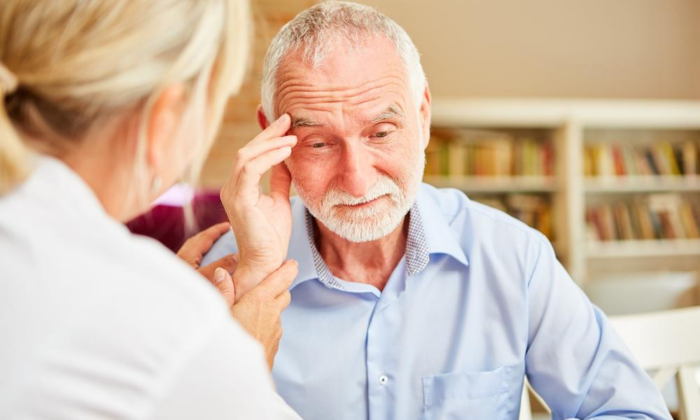
World-renowned Hollywood star Bruce Willis was first diagnosed with aphasia in the spring of 2022, and with frontotemporal dementia more recently, for which there is no cure to date. With an increasing number of countries entering the stage of societal aging, dementia has become a major problem that many families and the general public need to face.
In an interview with the “Health 1+1” program, Dr. Guo Dawei from Fuyuan Traditional Chinese Medicine Clinic in Taiwan shared his experience on how to improve and treat dementia through the application of Chinese medicinal herbs, acupuncture, and/or massage, as well as dietary therapy and tea drinks.
Dementia can be divided into two types—vascular, and degenerative. Vascular dementia is caused by cerebrovascular lesions, such as severe stroke and progressive degeneration of small blood vessels in the brain. It is characterized by sudden deterioration of cognitive function, dramatic changes in mood and personality, urinary incontinence, and loss of physical balance.
Depending on the area where the brain function starts to decline, degenerative dementia is divided into the following three types with visibly different symptoms.
1. Alzheimer’s disease: By far the most common dementia recorded. It is usually caused by damage to the brain nerves in areas such as the hippocampus and cerebral cortex that oversee memory, feeling, and emotions. The main symptoms include memory function decline, impaired judgment, hallucinations, and depressed mood.
2. Frontotemporal dementia: In this case, the frontal and temporal lobes of the brain are damaged, and symptoms such as personality changes and inappropriate behaviors start in the early stages, including reduced language capability, resulting in language barriers and aphasia.
3. Lewy body dementia: Caused by protein deposition in brain tissue, symptoms of this type of dementia usually begin to show around the age of 50. In addition to cognitive impairment, there are symptoms such as repetitive and unexplained falls, and distinct visual or auditory hallucinations.
4 Common Types of Frontotemporal Dementia
The frontotemporal dementia that Bruce Willis suffers from can be further divided into four common types.
1. Behavioral variant frontotemporal dementia: Early symptoms include emotional abnormalities, personality changes, or executive function deficits. Abnormalities such as sudden indifference and impulsiveness of the individual, loss of interest in things that he or she was passionate about in the past, obvious deterioration of work ability, and sudden changes in eating habits warrant special attention.
2. Semantic aphasic frontotemporal dementia: This type of patient retains fluent expressive ability in the early stages, but suddenly loses the ability to understand specific words, or has difficulty expressing certain common nouns, such as forgetting the word “dog” and calling it a “four-legged animal” instead.
3. Non-fluent aphasic frontotemporal dementia: Verbal expressions become less fluent and hesitant, with a reduction in vocabulary, often accompanied by grammatical mistakes. Such patients can normally recognize simple vocabulary but have difficulty understanding more complex sentences.
4. Frontotemporal dementia combined with motor neuron disease: These include cases accompanied by amyotrophic lateral sclerosis and Parkinson’s disease.
5 Sports With High Potential to Cause Brain Damage
Regarding the cause of Bruce Willis’ illness, some have postulated that due to his specialization in martial arts acting, he likely received some hard blows to the head. Guo believes that this could be a possibility as vascular dementia is mainly caused by cerebrovascular disease and brain injury due to physical trauma.
The sports Guo suggests to be most likely to cause brain injuries are the following:
1. Boxing: Boxers aim for the head of their opponent as the main area of attack to achieve a knockout. There are quite a number of cases of retired boxers being plagued by various diseases, with brain complications being the most common.
2. Soccer: The head has the potential to be injured when a player “heads” the ball.
3. American football: A 2017 study published in the Journal of the American Medical Association found that 110 out of 111 deceased NFL players had chronic traumatic encephalopathy, a degenerative disease associated with repetitive head knocks related to impact.

4. Mixed Martial Arts: This is a combat sport that uses a mix of different martial arts techniques, often with attacks to the head.
5. Equestrian sports: The sport with the highest rate of head trauma is indeed horse riding. A study published in the journal Neurosurgical Focus in 2016 analyzed data from the U.S. National Trauma Data Bank between 2003 and 2012 found that equestrian sports led to the highest rate of traumatic brain injuries in adults, accounting for 45.2 percent.
TCM’s Way to Treat Dementia
Guo said that for the substantive lesions and abnormal functions of the brains of dementia patients, traditional Chinese medicine (TCM) usually starts with Chinese medicinal herbs and acupoint therapy.
Guo noted that the cerebral cortex links to different organs of the body. Any stimulation on the scalp through acupuncture needles creates a resonance effect, stimulating and activating corresponding brain functions. For example, for people with aphasia, areas related to speech functions can be activated, and for people with physical disabilities, parts dealing with movement can be activated. All the relevant areas can also be combined with cupping therapy on the patient’s back.
Guo pointed out that Chinese medicinal herbs including Carthamus tinctorius, frankincense, and Commiphora myrrha that promote blood circulation and remove blood stasis are the most popular choices. They all have the effect of refreshing the brain and resuscitation properties.
In addition, studies have found that the extract of Gastrodia elata also has neuroprotective effects. It nourishes the brain and improves intelligence, Gastrodia elata as well as has a certain effect on helping sleep.
Acupoint Locations for Dementia
Guo said that dementia can be prevented and/or improved by massaging certain acupoints. According to TCM theory, the meridian is the energy channel of the body, and the internal organs are all connected to the surface of the body through the meridian. Some points on the meridians that have special functions are called acupoints. Stimulating the corresponding acupoints through acupuncture and/or massage can treat diseases of the corresponding viscera inside.
Massaging certain acupoints on the head, such as Baihui, Sishencong, Shenting, and Benshen, can reduce mental symptoms, improve memory, and help maintain language and thinking capabilities. In addition, massaging the acupoints on the face, such as Yintang and Cuanzhu can help calm the mind.
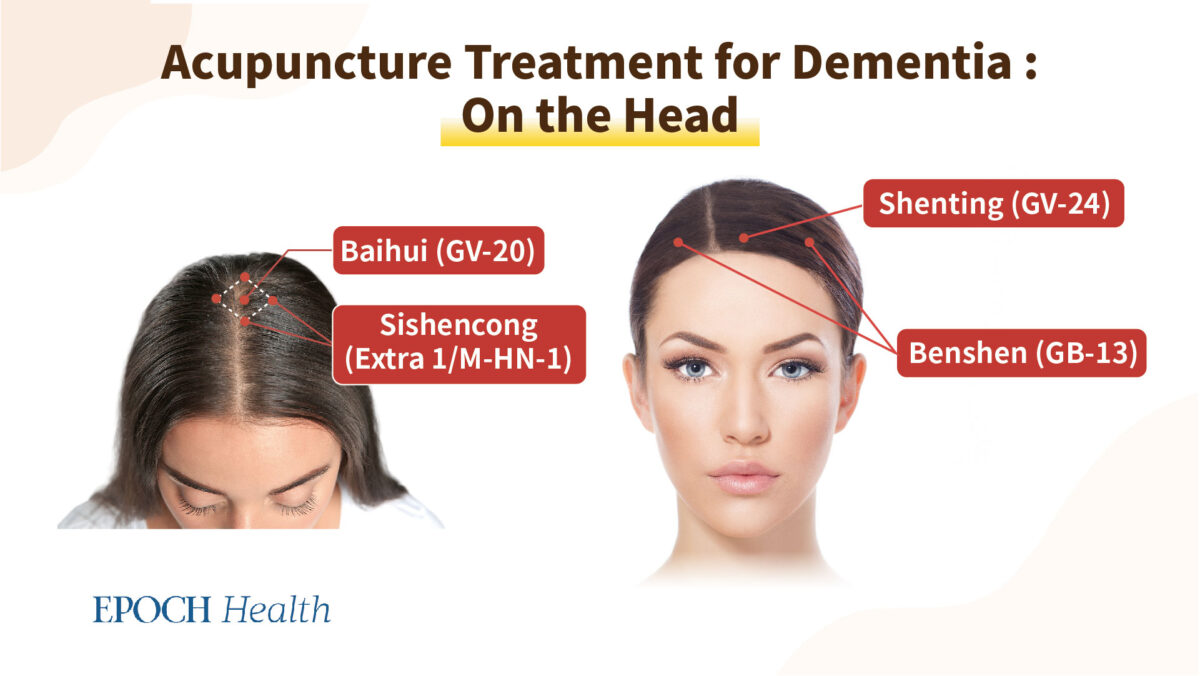
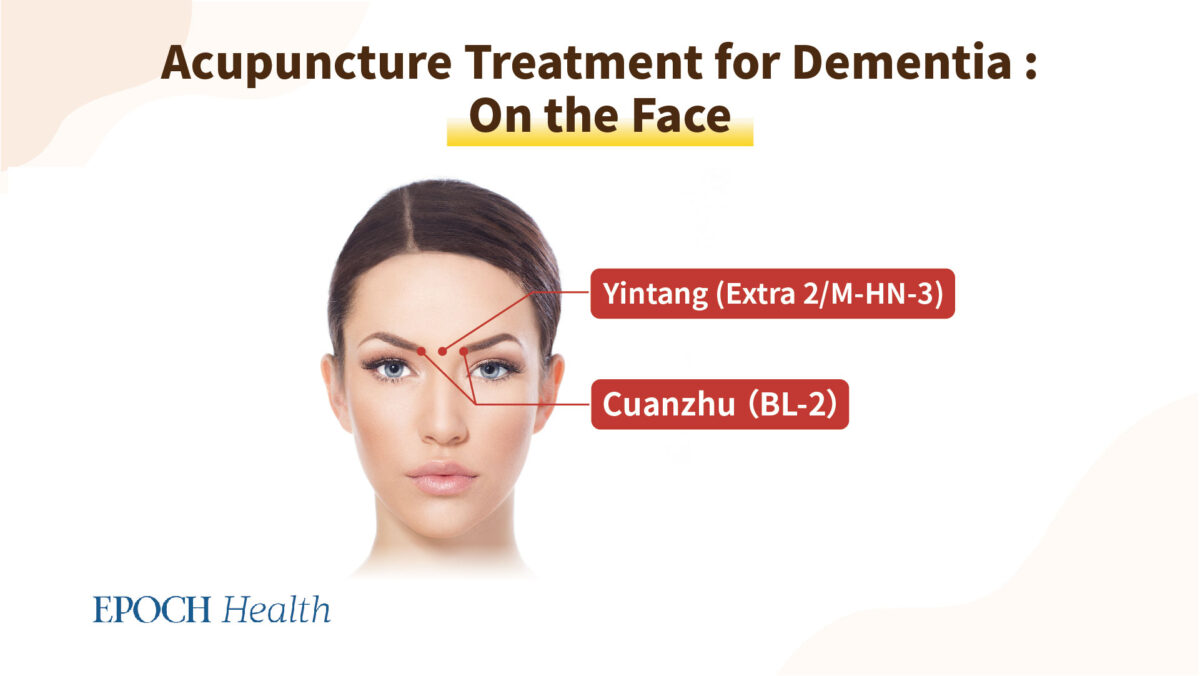
Guo suggested that you can massage the ears with both hands, and stimulate the auricular points on the ears, such as the heart point, the Shenmen point, and the subcortical point, which can regulate the nerves and calm the mind.
(Health 1+1/The Epoch Times)
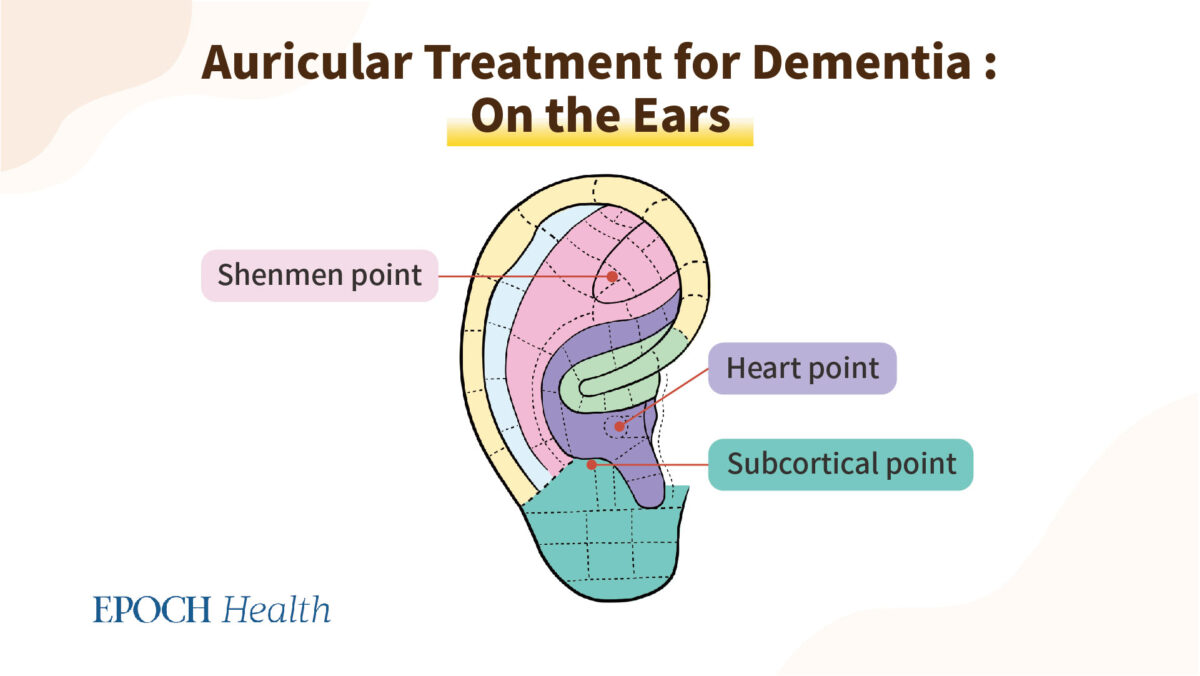
According to Guo, you can also massage acupoints on the limbs, such as the Xuehai, Zusanli, Fenglong, and Sanyinjiao on the lower limbs, which can boost the spirit and improve physical activity. In addition, massaging the Shenmen near the wrist can suppress anxiety, help sleep, and ease emotional instability in the elderly.
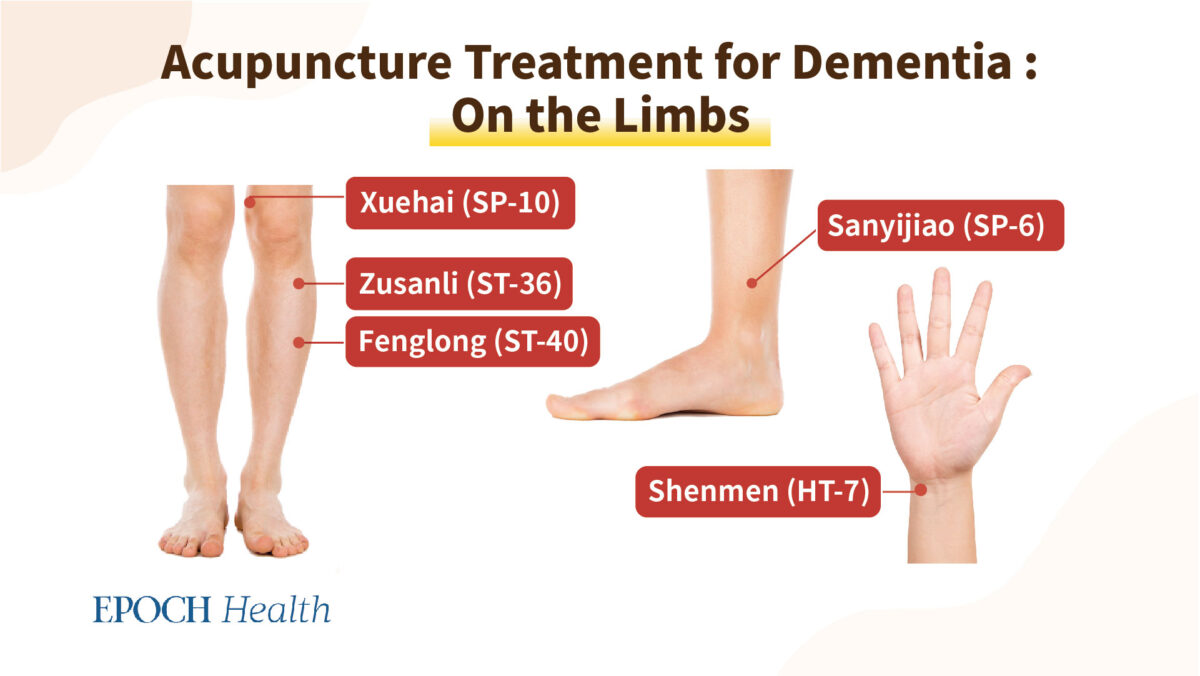
Anti-Dementia Tea and Herbal Diet
Guo recommended one tea drink and one medicinal soup recipe to help prevent dementia.
Brain refreshing tea
Ingredients: Gastrodia elata 4 gm (about 0.14 ounce), Codonopsis pilosula 8 gm (about 0.28 ounce), Salvia miltiorrhiza 8 gm ( about 0.28 ounce), licorice 2 gm (about 0.07 ounce), lily 4 gm ( about 0.14 ounce).
Preparation: Brew all the above in 500ml of boiling water, and drink after 5 minutes Rebrew the remainder for a second serving.
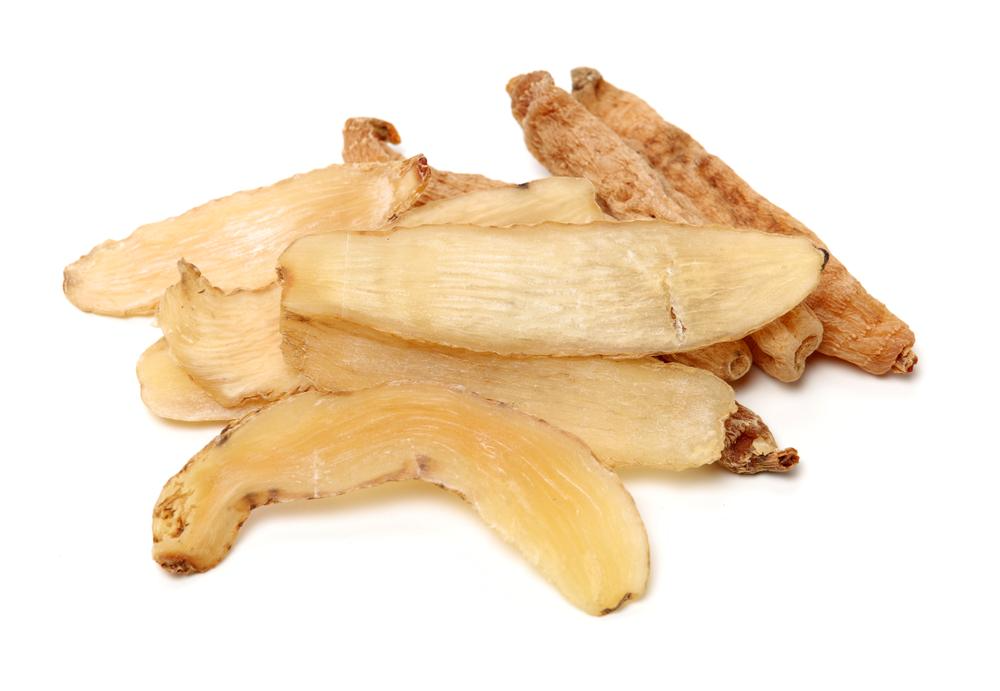
Fallopia multiflora silky chicken soup
Ingredients: 1 silky chicken, 10 fresh shiitake mushrooms, wolfberry (goji berry) 12 gm (about 0.4 ounce), 10 red dates, Gastrodia elata 20 gm (about 0.7 ounce), Fallopia multiflora 12 gm (about 0.4 ounce), and an appropriate amount of salt.
Preparation:
1. Cut the silky chicken into pieces, wash, and blanch, then put aside for later use. Wash and slice fresh shiitake mushrooms, wash then soak wolfberry and red dates (pitted) in water. Wash slices of Gastrodia elata, and soak in water for 30 minutes until it becomes soft.
2. Boil a pot of water, add chicken and red dates, boil all together for 5 minutes, turn to low heat, and simmer for about another 30 minutes. Add the soaked wolfberries and shiitake mushrooms. Add gastrodia elata after the soup is fully cooked. Simmer for about another 20 minutes on low heat and add some salt to taste.
3. Guo said that Gastrodia elata has the effects of nourishing the brain, improving intelligence, calming, and helping sleep. Silky chicken has the effect of nourishing the kidneys and enhancing immunity. The stewed Gastrodia chicken soup is sweet and delicious. It can be used as a daily health care soup and can also aid in the prevention of dementia. However, Gastrodia elata is easy to evaporate, so be careful not to cook it for too long a time.
Some of the above-mentioned herbs may sound unfamiliar, but many are available in Asian supermarkets.
Because everyone’s physique is different, please consult a professional physician for specific treatment options.







